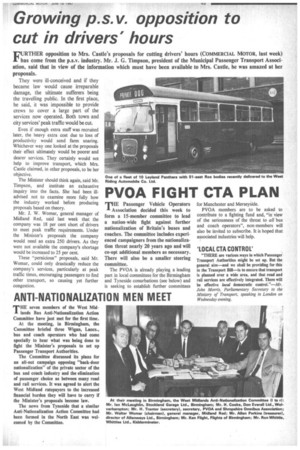Growing p.s.v. opposition to Cut in drivers' hours
Page 47

If you've noticed an error in this article please click here to report it so we can fix it.
VURTHER opposition to Mrs. Castle's proposals for cutting drivers' hours (COMMERCIAL MOTOR, last week) I has come from the p.s.v. industry. Mr. .1. G. Timpson, president of the Municipal Passenger Transport Association, said that in view of the information which must have been available to Mrs. Castle, he was amazed at her
proposals.
They were ill-conceived and if they became law would cause irreparable damage, the ultimate sufferers being the travelling public. In the first place, he said, it was impossible to provide crews to cover a large part of the services now operated. Both town and city services' peak traffic would be cut.
Even if enough extra staff was recruited later, the heavy extra cost due to loss of productivity would send fares soaring. Whichever way one looked at the proposals their effect ultimately would be poorer and dearer services. They certainly would not help to improve transport, which Mrs. Castle claimed, in other proposals, to be her objective.
The Minister should think again, said Mr. Timpson, and institute an exhaustive inquiry into the facts. She had been illadvised not to examine more fully how the industry worked before producing proposals based on theory.
Mr. J. W. Womar, general manager of Midland Red, said last week that the company was 18 per cent short of drivers to meet peak traffic requirements. Under the Minister's proposals the company would need an extra 250 drivers. As they were not available the company's shortage would be increased to 25 per cent.
These "pernicious" proposals, said Mr. Womar, could only drastically reduce the company's services, particularly at peak traffic times, encouraging passengers to find other transport, so causing yet further congestion.




































































































































